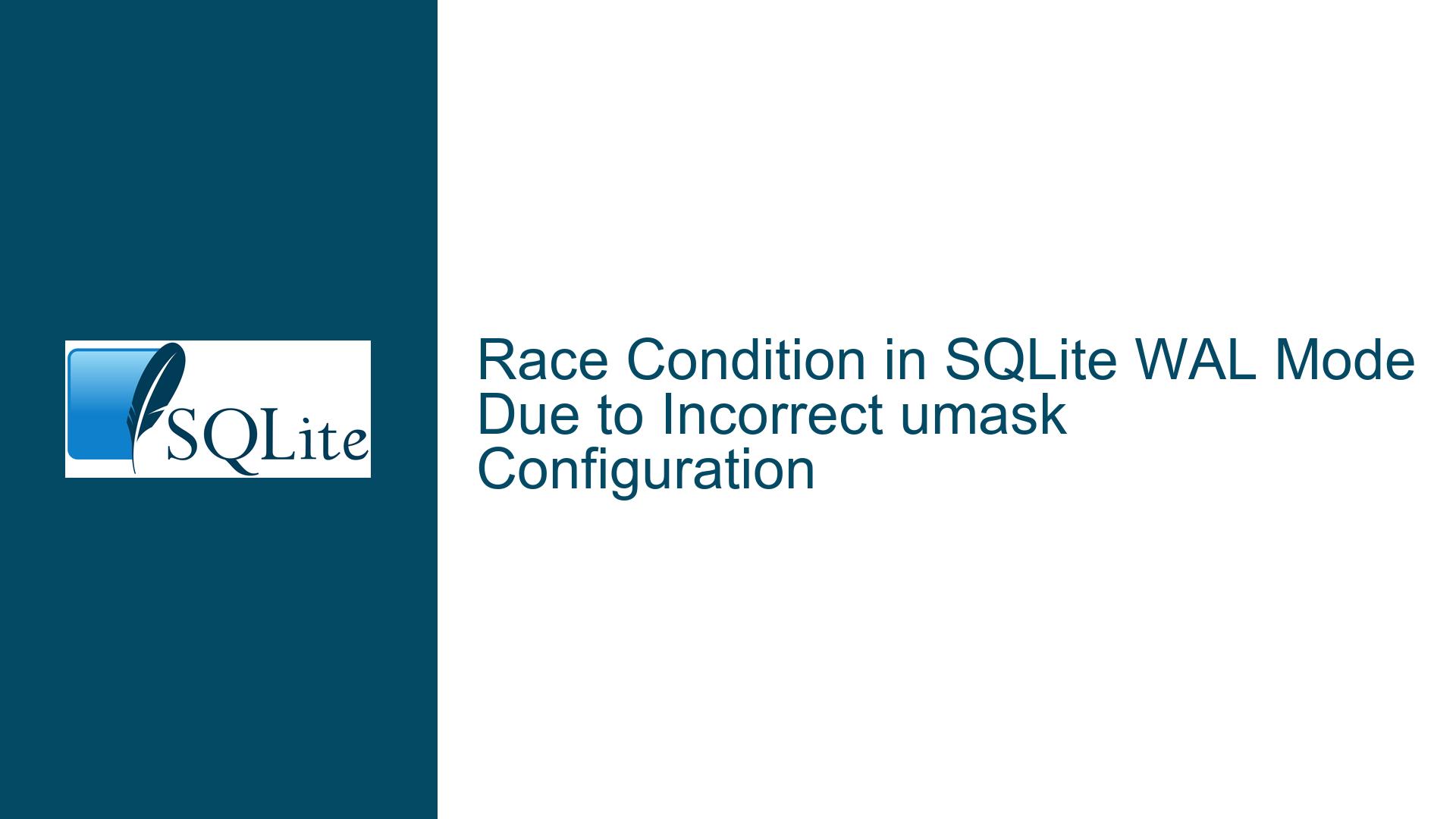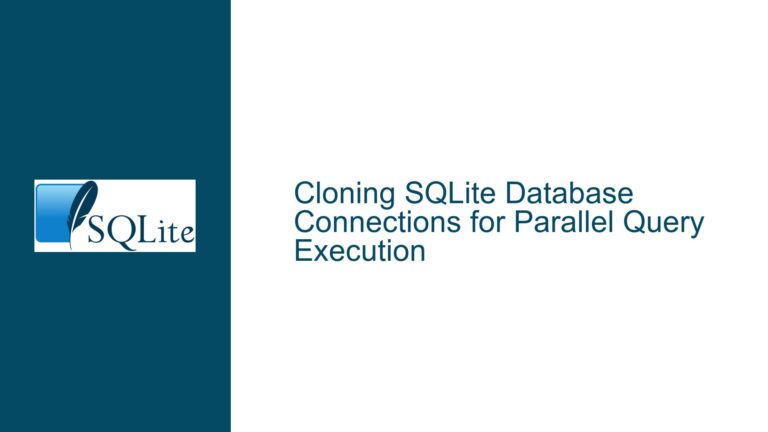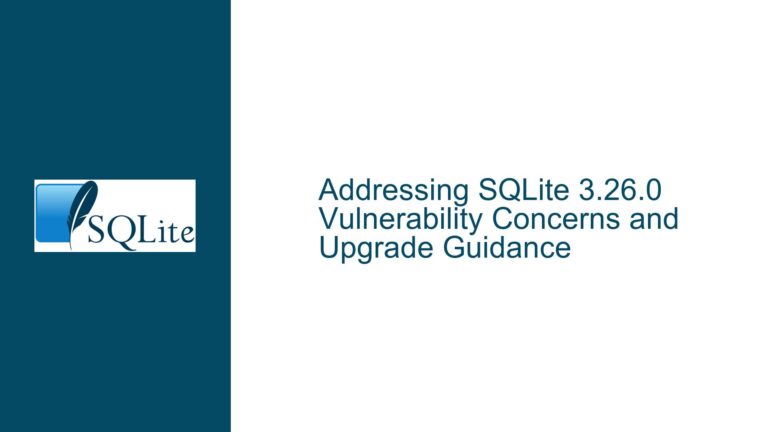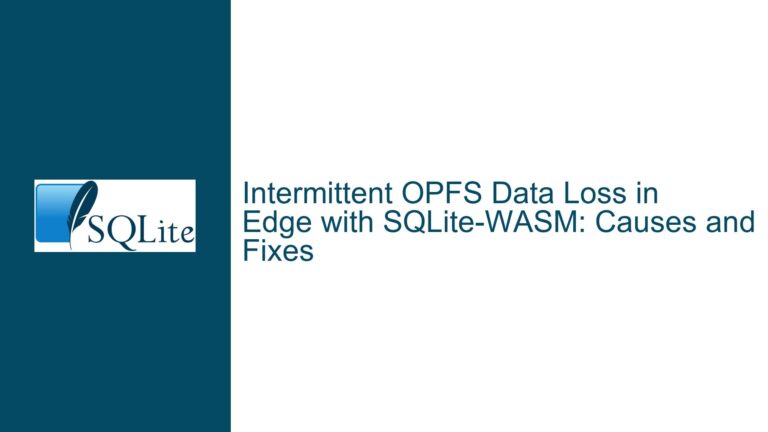Race Condition in SQLite WAL Mode Due to Incorrect umask Configuration
Issue Overview: Race Condition in WAL Mode with Multiple Users and Incorrect umask
When using SQLite in Write-Ahead Logging (WAL) mode with multiple processes accessing the same database under different user IDs but sharing the same group ID, a race condition can occur. This race condition manifests when processes attempt to write to the database using BEGIN IMMEDIATE transactions. The error message "Runtime error near line 1: attempt to write a readonly database (8)" is intermittently observed, indicating that one or more processes are unable to acquire the necessary write permissions on the database files.
The root cause of this issue lies in the interaction between the file creation process, the default umask setting, and the permissions applied to the shared memory (-shm) and write-ahead log (-wal) files. Specifically, the default umask of 022 results in the creation of -shm and -wal files with permissions 640 (i.e., -rw-r-----), which do not grant write access to other users in the same group. This creates a race condition where one process may attempt to write to these files while they are still in a read-only state for other processes.
The issue is further exacerbated by the fact that SQLite’s robust_open function initially opens these files with the same permissions as the main database file (660, i.e., -rw-rw----), but the umask setting reduces these permissions to 640 during the file creation process. Although the function later attempts to correct these permissions using chmod, there is a brief window during which the files remain in a read-only state for other processes. This window is sufficient to trigger the "attempt to write a readonly database" error when multiple processes attempt to write to the database simultaneously.
Possible Causes: Incorrect umask and Race Conditions in File Creation
The primary cause of this issue is the default umask setting of 022, which restricts write permissions for group members when files are created. In a multi-user environment where processes running under different user IDs share access to the same database files, this restriction can lead to intermittent write failures. The umask setting effectively overrides the intended permissions (660) during the initial file creation, resulting in files that are temporarily read-only for group members.
A secondary cause is the race condition introduced by the sequence of operations in SQLite’s robust_open function. This function first opens the -shm and -wal files with the permissions of the main database file (660), but the umask setting reduces these permissions to 640 during the creation process. Although the function later attempts to correct these permissions using chmod, there is a brief period during which the files remain in a read-only state for other processes. This race condition is particularly problematic in high-concurrency environments where multiple processes may attempt to write to the database simultaneously.
Additionally, the proposed fix of overriding the umask within the robust_open function introduces its own set of challenges. Specifically, setting the umask to 0 within a multi-threaded process can lead to unintended consequences, such as files being created with overly permissive permissions (666) by other threads within the same process. This can result in security vulnerabilities and further complicate the issue.
Troubleshooting Steps, Solutions & Fixes: Addressing the umask and Race Condition
To resolve this issue, several approaches can be taken, each with its own trade-offs. The most straightforward solution is to adjust the default umask setting for all processes accessing the database. By setting the umask to 002, group members will retain write permissions on newly created files, eliminating the race condition caused by the temporary read-only state of the -shm and -wal files. This can be achieved by modifying the startup scripts or environment settings for the processes accessing the database.
However, if changing the umask setting is not feasible, an alternative approach is to modify the SQLite source code to ensure that the -shm and -wal files are created with the correct permissions from the outset. This can be done by overriding the umask within the robust_open function, as proposed in the original discussion. However, care must be taken to ensure that this change does not introduce new race conditions or security vulnerabilities. Specifically, the umask should be restored to its original value immediately after the files are created, and the change should be made in a thread-safe manner to avoid unintended side effects.
Another potential solution is to use a different file creation strategy that avoids the race condition altogether. For example, the -shm and -wal files could be created with a temporary name and then renamed to their final names once the correct permissions have been applied. This would ensure that other processes never see the files in an inconsistent state. However, this approach would require significant changes to the SQLite codebase and may not be practical in all situations.
In addition to these technical solutions, it is important to document the issue and provide guidance to users who may encounter similar problems in the future. This documentation should include information on the correct umask settings for multi-user environments, as well as any known issues or limitations related to file permissions in WAL mode. By providing clear and comprehensive documentation, users can avoid common pitfalls and ensure that their databases operate smoothly in high-concurrency environments.
Finally, it is worth considering whether the current behavior of SQLite in WAL mode is optimal for multi-user environments. While the WAL mode provides significant performance benefits, the reliance on shared memory and write-ahead log files introduces additional complexity and potential for race conditions. Future versions of SQLite could address these issues by providing more robust file creation and permission handling mechanisms, or by offering alternative concurrency models that are better suited to multi-user environments.
In conclusion, the issue of race conditions in SQLite WAL mode due to incorrect umask settings can be addressed through a combination of configuration changes, code modifications, and improved documentation. By carefully considering the trade-offs of each approach and implementing the most appropriate solution for your specific environment, you can ensure that your database operates reliably and efficiently, even under high concurrency.






